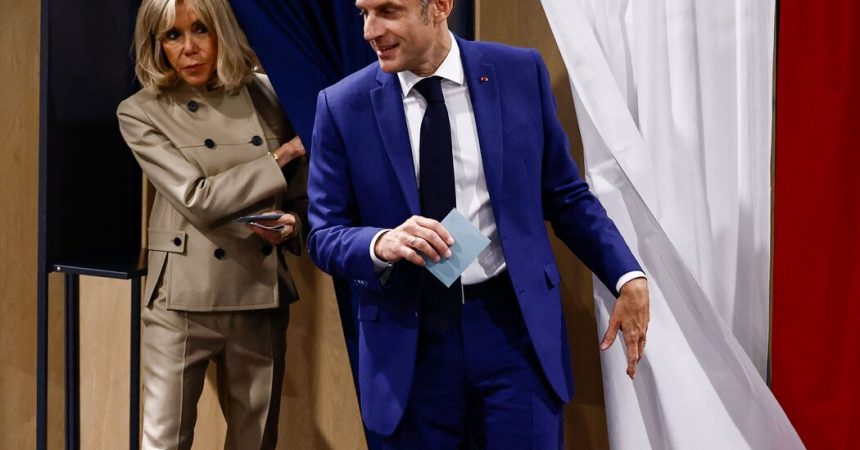The far right appears to dominate the French elections
The National Rally party crushed its opponents in the first round of voting for the French National Assembly, according to early projections, bringing its long-taboo brand of nationalist, anti-immigrant politics to the brink of power.
Pollsters’ projections, which are normally reliable, suggested the party would take about 34 percent of the vote, far ahead of President Emmanuel Macron’s centrist Renaissance party and its allies, which got about 21 percent. A coalition of left-wing parties won about 29 percent of the vote, the projections showed.
The scores, in a two-round election that will end in a runoff on July 7 between the leading parties in each constituency, do not provide a precise forecast of the number of parliamentary seats each party will secure. But the National Rally now looks very likely to be the largest force in the lower house, although not necessarily with an absolute majority.
For Macron, the result represented a severe setback after he gambled that his party’s stinging defeat to the National Rally in the recent European Parliament election would not be repeated. His decision to hold the election now, just weeks before the Paris Olympics, astonished many people in France — not least his own prime minister, who was kept in the dark.
What’s next: Macron called “for a large, clearly democratic and republican alliance” to win out in the second round of voting, but he has struggled to form stable coalitions.
Analysis: Both France and the U.S. face nationalist forces that could undo their international commitments and pitch the world into uncharted territory.
Iran’s election moves to a runoff
Iranian voters used the country’s presidential election on Friday to signal their discontent with Iran’s system of clerical rule, trudging to the polls in record-low numbers to help two candidates limp to a runoff.
The final choice will be between a reformist former health minister, Dr. Masoud Pezeshkian, and an ultraconservative former nuclear negotiator, Saeed Jalili. Neither won more than 50 percent of the vote, which means it will take a runoff on July 5 to establish who will tackle challenges like Iran’s struggling economy and the risk of a wider conflict in the Middle East.
The campaign was notable for how openly the candidates attacked the status quo, but the turnout reflected pessimism that a new president could effect change: They must govern with the ultimate approval of Iran’s supreme leader, Ayatollah Ali Khamenei.
Here’s more about the initial candidates, and these are four takeaways from the election.
A string of suicide bombings rocks Nigeria
At least 18 were killed and dozens were wounded in a series of suicide bombings — all carried out by women, and striking events like a wedding and a funeral — on Saturday afternoon in Nigeria, local officials said.
The blasts resembled assaults carried out by Boko Haram, whose fighters have killed tens of thousands in Nigeria and whose aggression in the region has led to the displacement of more than two million people. Boko Haram insurgents have abducted thousands of teenage girls, coerced them into marriages and forced them to carry out suicide attacks at schools, markets, religious buildings and large gatherings.
As of yesterday afternoon, no group had claimed responsibility for the attacks.
MORE TOP NEWS
During his years as president of the Philippines, Rodrigo Duterte promised immunity to the authorities for killing drug users and traffickers. Police officers and vigilantes summarily executed tens of thousands of people.
In the two years since Duterte left office, there has been little legal reckoning with the wave of killings. Now, many people in the Philippines hope that the International Criminal Court will take some action against Duterte.
CONVERSATION STARTERS
Japan’s first same-sex reality dating show
On July 9, Netflix is introducing Japan’s first same-sex reality dating series, “The Boyfriend,” which follows nine men living in a luxury beach house outside Tokyo. Japan lags other wealthy democracies in L.G.B.T.Q. rights, and even though public sentiment has moved toward support for gay and transgender people there, they are still sometimes subjected to discrimination and hate speech.
Dai Ota, the show’s executive producer, said he wanted to “portray same-sex relationships as they really are,” as opposed to the exaggerated, stereotypical gay characters often depicted on Japanese television.
The vibe is wholesome and mostly chaste. Sex rarely comes up, and friendship and self-improvement feature as prominently as romance. Whether the show will lead to broader acceptance of the L.G.B.T.Q. community in Japan remains to be seen.






